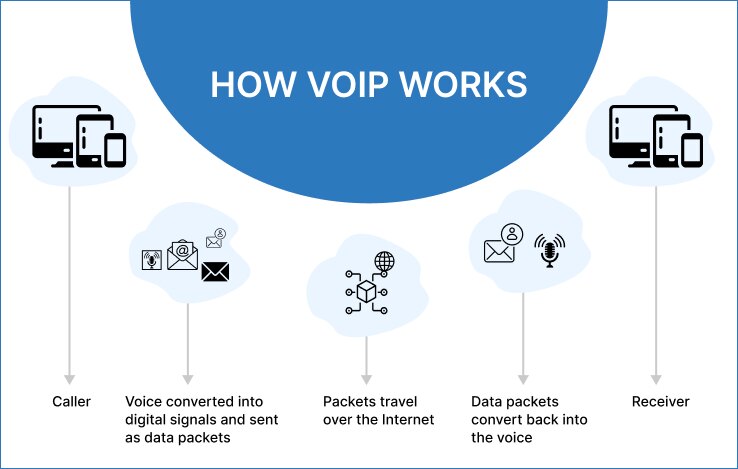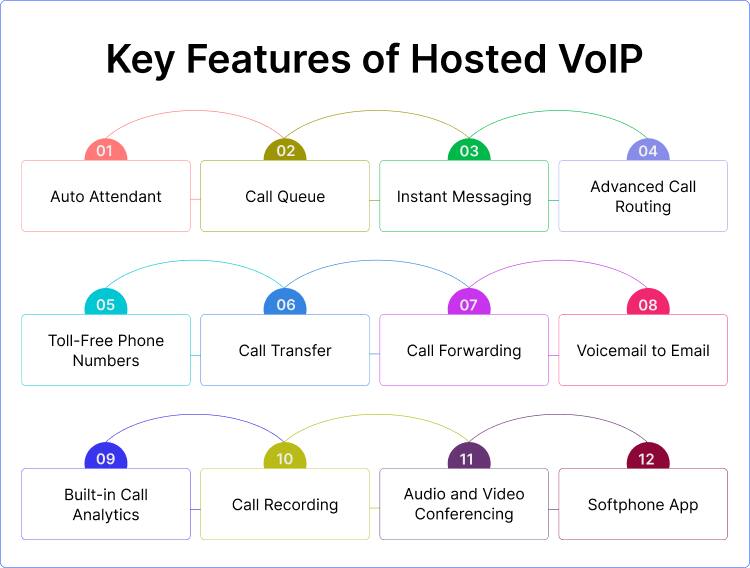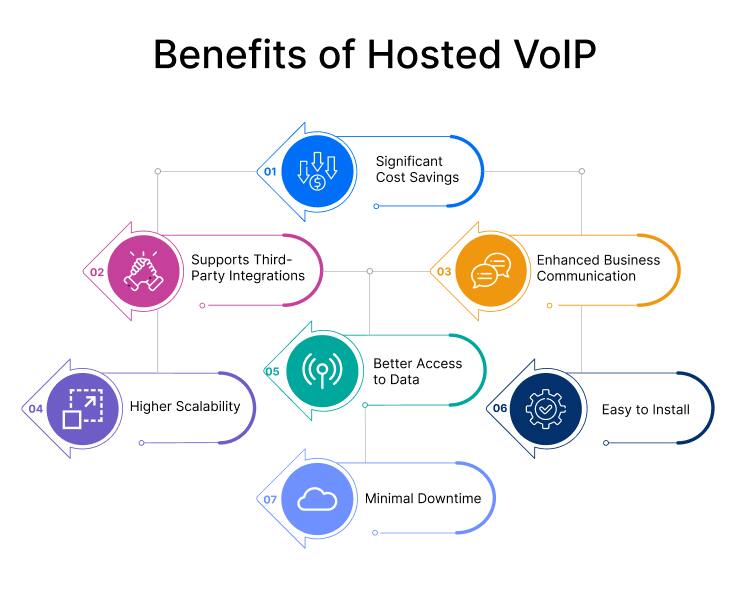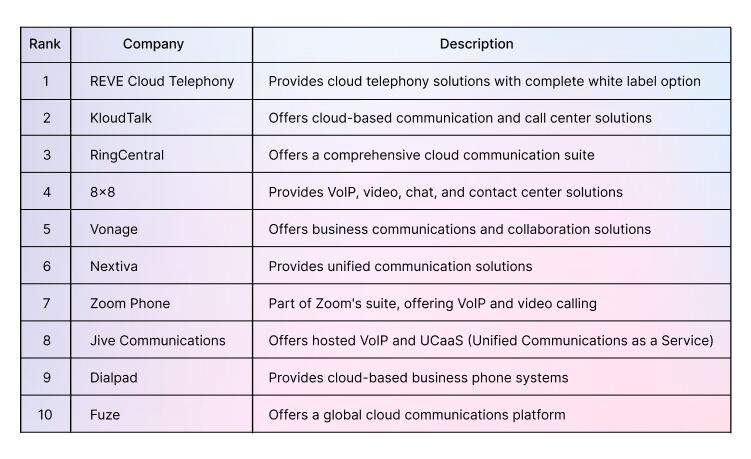
Steve Jobs once said, “Innovation distinguishes between a leader and a follower.” In today’s modern communication world, Hosted VoIP stands as a pioneer. Those bulky on-premise telephony systems are now a thing of the past, Hosted VoIP has grabbed the spotlight. The latest market assessment estimates that the projected market size of the VoIP industry is expected to reach $183.7 billion by 2027. And when it comes to the average savings when switching to VoIP, figures come between 50-75%. These mind-boggling numbers make us believe that VoIP is here and is going to stay for decades ahead.
Want to learn more about hosted VoIP? In this article, I’ll explain the concept of Hosted VoIP, how it is different from on-premise telephone systems, and illustrate different types of businesses that can benefit from hosted VOIP and of course the best hosted VoIP providers.
Let’s begin!
What is Hosted VoIP?
Hosted Voice over Internet Protocol is a type of communication service where VoIP is deployed with the help of Internet cloud technology. This type of communication service is managed and provided by a third-party vendor. Think of it like this: hosted VoIP services transform your internet into a magic tunnel for your calls and data.
You as a ‘Customer’ do not need to invest in any expensive hardware, unlike the traditional analog-based telephone systems. You just need to ensure the availability of a high-speed internet connection- DSL, cable, fiber, and 4G/5G cellular data which most businesses already have. Along with that, you will need a softphone or IP Phone or you can also use web-based access to use hosted VoIP services.
Hosted VoIP vs On-premise VoIP
There are 4 primary differences between hosted VoIP and On-premise VoIP:
1. Location of the VoIP Infrastructure
In the hosted VoIP setup, the infrastructure is located offsite i.e. at the service provider’s location.
In the on-premise VoIP setup, the infrastructure is located ‘in-house’ i.e. within the premises of the business or client entity.
2. Who Manages the VoIP Infrastructure?
In the case of hosted VoIP, the service is managed by the provider only. From maintenance, updates, and upgrades – all is done by the service provider.
On-premise VoIP setup is handled by the business or the customer entity itself. It requires dedicating IT resources to manage the system.
3. Associated Costs
Hosted VoIP models are typically subscription-based. This means you can pay-as-you-go while using the service monthly or yearly. The initial investment is minimal because there’s no hardware setup required. Hosted VoIP models are more affordable.
On-premise VoIP systems demand extensive upfront investment from the business. Besides hardware, other costs like software licensing are also to be borne by the business.
4. Suitability
It is often considered that on-premise VoIP is more suitable for large business setups that need more control over their communication infrastructure and have sufficient resources to manage it.
Hosted VoIP comes as an ideal solution for small to medium-sized businesses. Even with limited resources, SMBs can comfortably afford hosted VoIP by paying monthly or yearly service fees.
How Does Hosted VoIP Work?

I will explain this with the help of an example.
Picture this: You subscribed to a hosted VoIP service. Now you are making a call using this service. As you speak, your voice is converted into digital packets and transmitted over the internet to your service provider’s server. From there, your provider routes and connects your call with the recipient’s phone provider (landline or VoIP). This way your call reaches the intended recipient.
Similarly, when you receive a call, the process works in reverse. All this happens within seconds and results in a smooth flow of voice calls and data transfer.
Transitioning from PBX to Hosted VoIP
If a company or a business already has a PBX system and wants to switch to hosted VoIP, then they may choose to integrate both technologies. Hosted PBX and Hosted VoIP can work together in a complimentary manner to deliver a robust and feature-rich communication system. Businesses can retain their existing PBX system while leveraging the benefits of hosted VoIP.
Like the hosted VoIP, Hosted PBX is also maintained and managed in the cloud by a service provider. PBX solutions offer features like call routing, extensions, voicemail, etc. On the other hand, hosted VoIP offers a broader range of features voice calls, video calls, messaging, and collaboration tools.
For seamless and successful integration, the configuration of the two systems is done. This may include setting up SIP trunking to connect the PBX to the VoIP network.
12 Useful Features of Hosted VoIP

It is important to learn about the features of a product or service before buying it. A business relies heavily on communication infrastructure for its smooth working. Your choice of hosted VoIP will lay the foundation of your business communication. By learning about the features, you can avoid investing in a product that doesn’t align with your business requirements. So let’s take a look at the top 11 features of hosted VoIP:
1. Auto-Attendant
An auto-attendant can be considered as a virtual receptionist. It greets the caller, provides them with a menu, and directs them to an appropriate team or agent. Let’s say, you dial a business phone number and you hear a recorded message saying “Welcome to ABC Company! Press 1 for Sales, Press 2 for Billing, Press 3 for Support, ….”. That’s how an auto attendant guides a caller.
2. Call Queue
When customer support agents are occupied with other calls, then the call queueing system keeps the latest incoming calls on hold. The system maintains a queue so that the calls are answered in the order they were received. The call queue feature informs the waiting calls about their queue position and estimated waiting time as well.
3. Instant Messaging
Users can chat with each other one-on-one or in groups using the IM feature. Such quick and direct chats help in sharing information, files, and multimedia documents rapidly in a work environment.
4. Advanced Call Routing
The call routing feature works on a predefined set of rules or criteria. Incoming calls are directed based on the time of the day, agent availability, IVR inputs made by the caller, etc. For example, calls that arrive after office hours are directed to another support team in a different location.
5. Toll-Free Phone Numbers
Toll-free phone numbers are a popular way for customers to reach businesses without incurring any charges (the charges for incoming calls are covered by the business). These numbers usually appear like 1-800-XXX-XXXX.
6. Call Transfer
The beauty of VoIP is that it lets you transfer active calls from one person to another or from one device to another without the call getting interrupted. For instance, an office receptionist might transfer an incoming call to a specific department.
7. Call Forwarding
With this feature, calls can be forwarded from one phone number to another or one device to another. For example, an employee, who is currently out of the office, can forward calls from the office phone number to his personal mobile number so that no important calls are missed.
8. Voicemail-to-Email
Your voicemail messages are sent as audio files or transcriptions to your desired email inbox. Imagine the convenience of having the voicemail recording or written transcription – messages can be managed quite easily.
9. Built-in Call Analytics
This feature provides insights into call metrics. For example, call center managers can use these analytics to identify peak call volume time as well as to evaluate the performance of the agents.
10. Call Recording
One of the most useful features of hosted VoIP systems is call recording. All the incoming and outgoing conversations get recorded and stored in the system. Managers can use these recordings for quality, training, and compliance purposes.
11. Audio and Video Conferencing
This one is a must-have feature. Multiple participants can join in audio and video conference calls which is very helpful in internal business communication. They can share screens, and send and receive documents in the group. Extremely useful in conducting virtual meetings.
12. Softphone App
Hosted VoIP systems usually offer a softphone app so that users can access the system and its features from their smartphones. Such an app is available for major platforms like iOS, Android, and Windows.
Benefits of Hosted VoIP

When you are switching to Hosted VoIP you are not just moving from your traditional Telephone System to the Cloud, but you also gain several benefits, which are described below:
No Expensive Equipment Installation = Significant Cost Savings
Do you agree with the fact that money matters when you buy anything? You surely do! The best part of opting for hosted VoIP is that you don’t have to make hefty investments in equipment installation. Everything is hosted off-site, and all of the maintenance responsibility is on the VoIP provider. You just need to pay a monthly or annual subscription fee to the vendor.
Supports Third-Party Integrations
Probably you are already using a bunch of tools to manage and operate your business. This can be CRM software, an email management tool, or other project management software. You can simply integrate your Hosted VoIP system with all such business tools so that everything works just aligned and fine. While such integration is also possible in the case of conventional telephone systems, you will need to put in extra hardware and specialized software for that purpose. In the case of hosted VoIP, integration can be done digitally which is simple and easy.
Enhanced Business Communication
You have already learned about the plethora of features that VoIP offers. With access to features like Instant Messaging, Conferencing, Call Recording, etc., the business workflow gets extremely enhanced. Just imagine how quickly and comfortably colleagues can collaborate to accomplish their project goals using these features.
Higher Scalability = Better Growth
Another significant advantage of VoIP is that compared to on-premise solutions, they offer more scalability. As your business grows, VoIP easily scales to accommodate additional users, lines, or phone numbers. Even in case when you want to scale down, VoIP lets you do that with ease. And on top of that, all this can be done rapidly, just within a few minutes.
Better Access to Data
You want to offer a great service to your customers. But how do you do that? First, you need to understand your customers as well as the performance of your agents. VoIP systems offer business insights into call volume, peak times, and customer behavior. These can be your key metrics to make informed decisions and enhance customer service.
Easy to Install
Hosted VoIP systems are accessible through user-friendly interfaces. One doesn’t need any extensive technical knowledge to operate these systems. Some of the most general steps to get started include creating an account with the VoIP provider and exploring the functions straightforwardly. Your vendor may also provide you with friendly how-to guides.
Minimal Downtime
Hosted VoIP systems are always On. Yes, most of the reliable hosted VoIP providers offer a 99.99% uptime guarantee in their SLA (Service Level Agreement). The best part is that they also offer a Disaster Recovery Plan. This is a lot helpful if in case your service gets affected due to any reason, they will shift the system to another server, which hardly happens within seconds.
7 Types of Businesses that can Benefit from Hosted VoIP
Hosted VoIP can help various types of businesses enhance their communication capabilities. Here are examples of some specific types of businesses:
1. Small to Medium Sized Businesses
The cost-savings and scalability offered by hosted VoIP are often valued by SMBs. Moreover, the simplicity and quick deployment of this service makes it a preferred choice.
Example: A small marketing agency can establish a professional communication system using hosted VoIP without needing to make any large investments in the infrastructure.
2. Remote and Distributed Teams
Hosted VoIP is an ideal fit for teams that are dispersed and work remotely. They need tools and functionalities that can help them communicate and collaborate with ease. VoIP offers all such features as video conferencing, instant messaging, etc.
Example: A tech startup with remote employees can benefit from VoIP by conducting virtual meetings and supporting flexible work arrangements.
3. Customer Support and Call Centers
These types of businesses encounter customer queries daily. Auto attendant, call routing, and call forwarding are some of the features offered by VoIP that can help call centers handle queries efficiently.
Example: A customer support center handling queries for an e-commerce platform can manage customer queries using hosted VoIP.
4. Professional Services
Consulting businesses can greatly benefit from hosted VoIP. Features like call recording and voicemail-to-email can help deliver better service to customers and comply with lawful regulations.
Example: A law firm or accounting consultancy can keep track of customer interactions using features of hosted VoIP.
5. Hospitality Services
Hosted VoIP can be of great value for businesses in the hospitality industry. They can leverage hosted VoIP for internal and external communication using features like auto attendant and call queues.
Example: A Hotel business can use the auto attendant feature to make reservations for guests.
6. Educational Institutions
VoIP can deliver great value when used for managing administrative work, communication between the faculty, and parent-teacher communication.
Example: Schools, colleges, and universities can conduct virtual classes using the hosted VoIP solutions.
7. Healthcare Services
Healthcare providers can utilize hosted VoIP to schedule patient appointments and internal collaboration among medical staff.
Example: A medical facility can integrate its electronic patient record with a hosted VoIP system to streamline patient care.
Top 10 Hosted VoIP Providers

Migrating to Hosted VoIP
Adopting a new technology may seem daunting, but through this article, we have ensured to dispel those fears. Now that you are familiar with the myriad of benefits of hosted VoIP and the top hosted VoIP providers, you can easily navigate the whole migration process. As a leading hosted VoIP provider, REVE Cloud Telephony offers a valuable opportunity to interested customers – A complimentary and fully assisted demo. Take advantage of this opportunity to learn about a robust and reliable hosted VoIP solution.




























